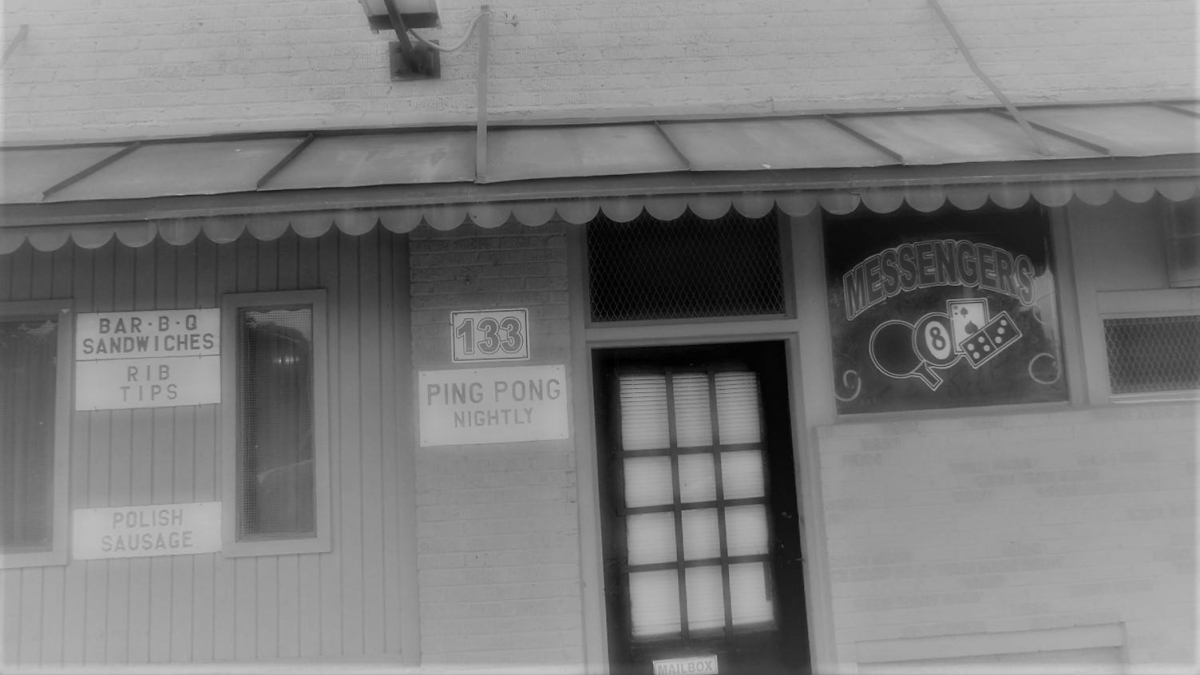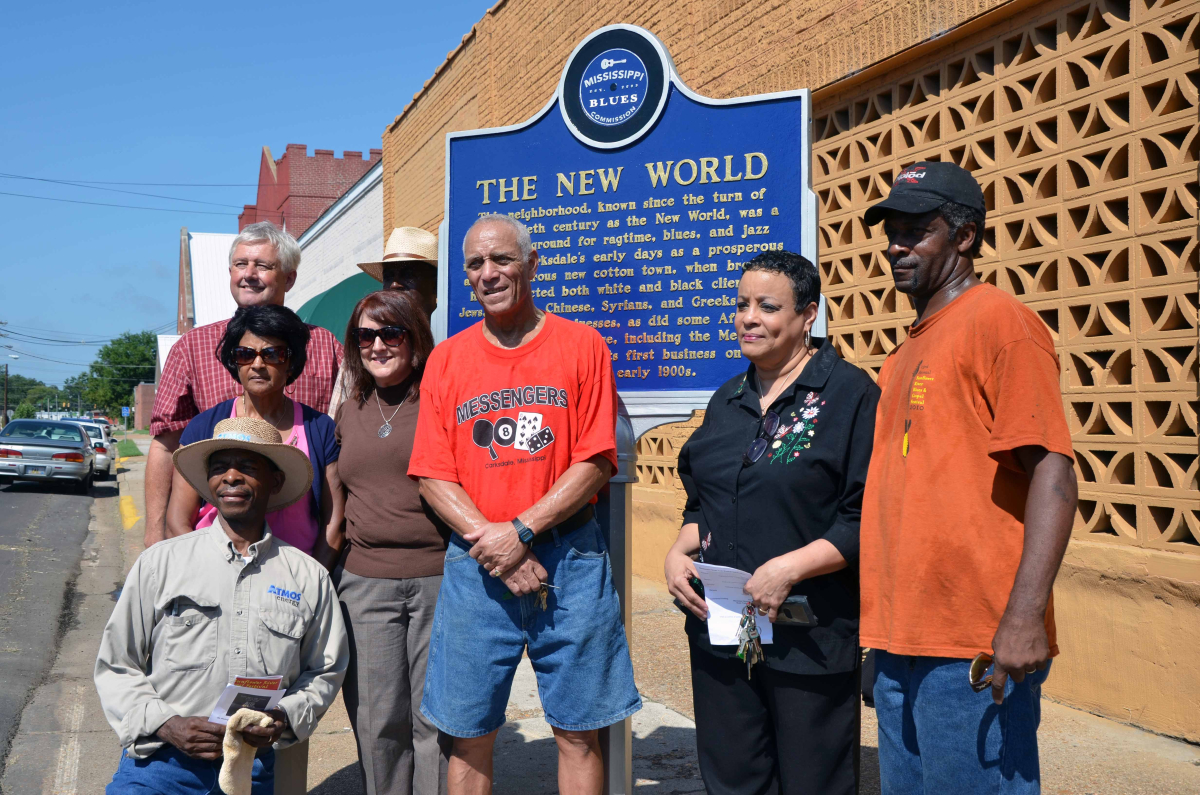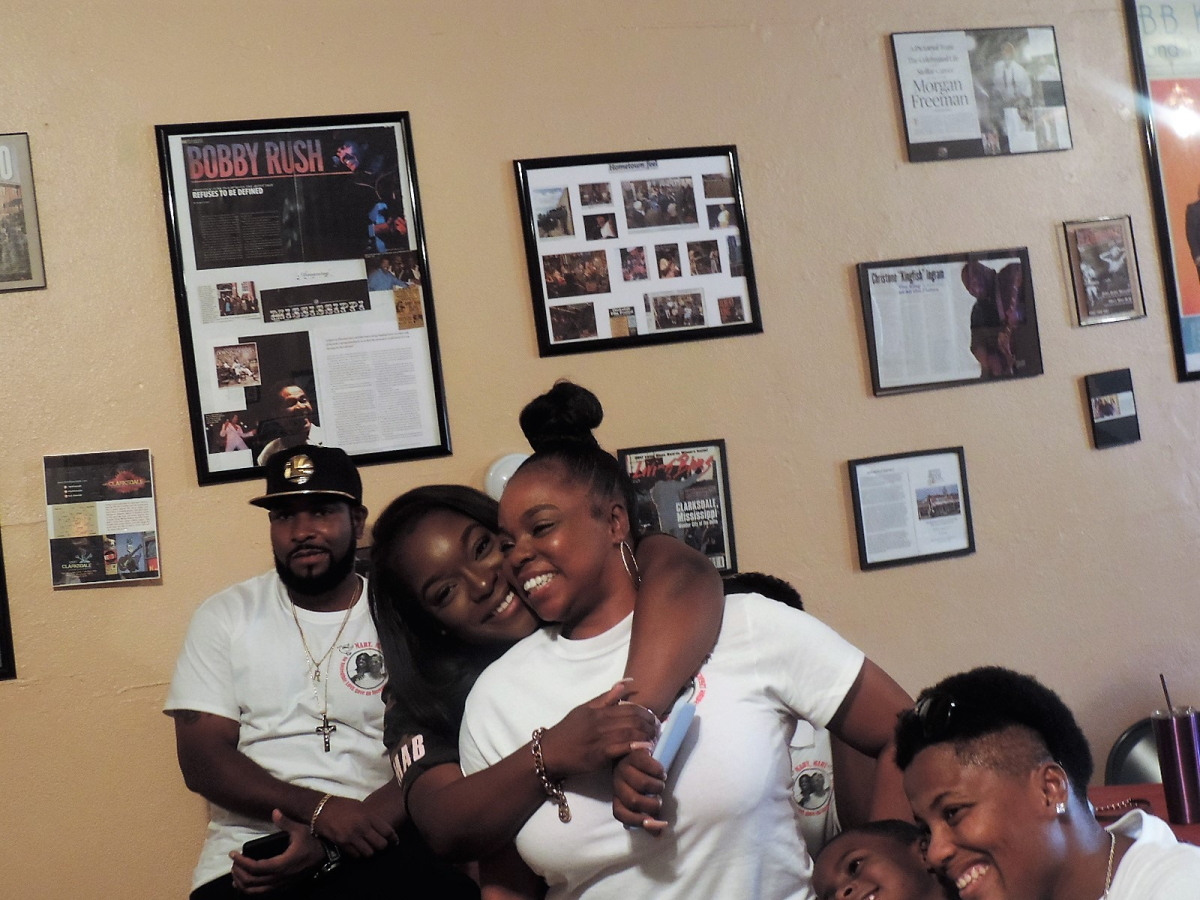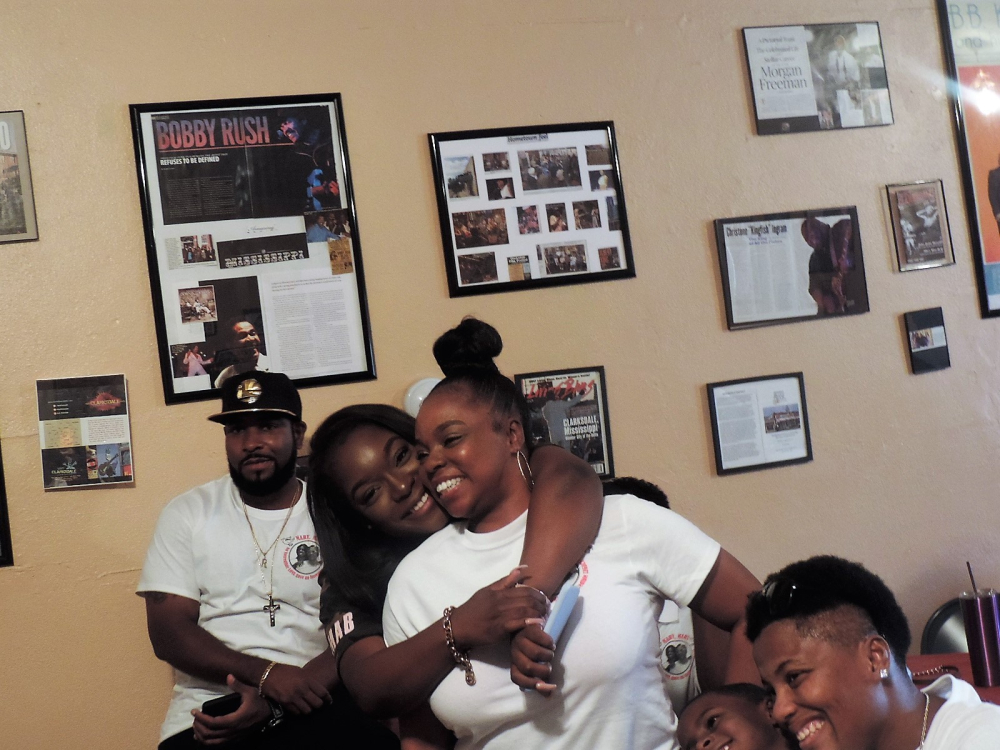Squat, square, clean but with a little wear, the building reads as solid and unpretentious as the city and the blues.
When I was growing up, Mr. George Messenger and his beautiful wife were the proprietors of Messenger’s Pool Hall. My Uncle Sherman, brother-in-law to George, frequented the spot, and for that reason, I equated it with old men and their pastimes: playing bones and shooting pool, drinking beers and telling tall tales around their cigarette smoke. The place wasn’t special; it just was, as it always had seemed to be. It wasn’t until I began researching for this piece that I began to register the truth and the fallacy of my childhood nonchalance. Clarksdale’s oldest continually-running business, Messenger’s is both enduring and integral to the history of both the city and the blues.
During the festivals, Messenger’s, like all of the city’s jukes,
swells with out-of-towners, but on any other night, it is and has always been where the
locals go.
The last time I was there was during the Juke Joint Festival in April 2018. It was uncommonly cold for that time of year, but the packed building was hot like July. The lounge side was rocking to some band from California or somewhere, performing a blues approximation that was good enough for the crowd of mostly drunk tourists. The game room was calmer: pool tables, dominoes, and a local woman winding to the sound of the actual blues spilling from the famous jukebox. Nearby, a tourist watched her moves with an open mouth, while one of the locals chuckled that they don’t make them like that in Massachusetts. The bar sold beer, not hard alcohol, but any of the Messengers behind the counter would sell you a setup for your liquor of choice. The kitchen was serving a single menu item: a polish sausage with a perfect burn on it, loaded with grilled onions, bell peppers, and mustard, served in a soft-bottomed tray. Cardiologists be damned, more people than not stood, munching them, confused at their complex tastiness. During the festivals, Messenger’s, like all of the city’s jukes, swells with out-of-towners, but on any other night, it is and has always been where the locals go.

Squat, square, clean but with a little wear, the building reads as solid and unpretentious as the city and the blues. Still, pride and history are palpable there, an ambience that is both old school and chill--after all, it was born to be a place where people could have a good time. Opened in 1910 by Edward Messenger, grandfather to George, the combination pool hall, domino den, juke joint, and café first served sharecroppers who came to town after they got paid. As early as 1907, Messenger had a liquor license, which is around the time the family owned its first business on what was then known as Fourth Street. Over the course of the century, they would own most of the real estate in that area, which would include buildings holding a barbershop, the black dentist, a funeral home, as well as St. Francis Catholic Center, where the neighborhood kids went after school. The original building was a few blocks down from the current one, nearer to Issaquena Street and the railroad tracks that bisected Clarksdale into neatly segregated sections. It held about three or four bar stools, and the menu was simple then, too: hamburgers and baloney sandwiches. As the business expanded, it came to be a mecca for the county’s poor black folk, where they could dine, listen to music, dance, and socialize, free from the constraints of work and the harassment of police. In the mid-1940s, the pool hall was relocated to its current, larger location.
As the business expanded, it came to be a mecca for the county’s poor black folk, where they could dine, listen to music, dance, and socialize, free from the constraints of work and the harassment of police.
Besides atmosphere, the pool halls’ locations, both smack dab in the middle of Clarksdale’s New World Neighborhood, contributed to their popularity and role in fostering the blues. According to the Mississippi Blues Commission:
This neighborhood…was a breeding ground for ragtime, blues, and jazz music in Clarksdale’s early days as a prosperous and adventurous new cotton town, when brothels here attracted both white and black clientele…blues singers performed on the streets, in juke joints, and at the train station. The demographic of the area was a literal new world as Jews, Italians, Chinese, Syrians, and Greeks owned various local businesses, as did some African Americans who lived here, including the Messenger family. 1
In a short film about Messenger’s Pool Hall, entitled simply “Messenger’s,” George spoke to James Hull on both the origins of the business and the blues. 2 He compared the life of the sharecropper to the hard, lowdown kind of blues. The music was born of that, he said: the misery of chopping cotton from sunup to sundown, the depression of never being able to get ahead, of always having just enough not to starve. Sharecroppers, like their enslaved counterparts, sang in the fields to make the workday go faster as well as to fuel their work. These songs, accompanied by improvised instruments, became the blues. The music, like Messenger’s (as well as other popular jukes), represented escape, albeit temporary. Messenger and his onscreen patrons spoke of the days of standing room only crowds with a line outside waiting to get in.
“People would be excited to come to town and see things they didn’t normally get to see,” said George.
“Messenger’s was the place to be,” a patron said. “It was the most enjoyable place for black folks…You could come pay your money and bump shoulders with celebrities.”
The Great Migration happened; the decline of the Southern downtown after Integration happened; the casinos happened; people, especially young people, left in waves. Yet Messenger’s Pool Hall lives to have celebrated its 100th birthday.
George mentioned the jukebox and how people kept it playing from the time the place would open until the time it closed. In his voice were both pride and regret. He never imagined himself running the place; he took over after the sudden, premature deaths of his parents, Ethel Mae and Leroy, in the 1960s. After leaving home for the military and experiencing life and freedom, he never saw himself voluntarily returning to second class citizenship, but he had younger siblings, who would have to go to foster care if he didn’t step in. Like that, a young man enjoying himself made the sacrifice and returned to a place he’d hated in the name of family. Just like the blues, his life became about duties and practicalities and desires, just out of reach. His addition to Messenger’s was ping pong, which he had found a fondness for in the military. I discovered this when speaking to Eddie and Marthella, two of the siblings George came home to care for. 3 Their earliest memories were of Messenger’s in the 1960s, just after the heyday, where the jukebox was king and they worked bussing tables for their parents. From the 1960s on, a steady decline became a steep one.
Eddie said, “Messenger’s went the way of Clarksdale.”
The Great Migration happened; the decline of the Southern downtown after Integration happened; the casinos happened; people, especially young people, left in waves. Yet Messenger’s Pool Hall lives to have celebrated its 100th birthday. Recently, Sherman, Marthella, and family spruced the place up with new paint and the blues photos that line the lounge, and it remains strong in the midst of a downtown that decades ago crumbled around it. Besides St. James Temple down the block, near where the original building stood, there is no time in my lifetime have I known for sure that any of the other buildings on that end of Fourth Street (now MLK, Jr. Boulevard) were open for business.
“It’s nothing like it used to be,” said George, and, “The blues left Clarksdale just like everything else.”
Hull had a less cynical view. “I would think Ground Zero and a five-star restaurant (Madidi’s, which has since closed) represent progress in the city.”
“Progress for who?” said George, deadpan.

George Messenger (in the red shirt), his wife, Myrtle (to his right), Addie's uncle, Sherman (kneeling in the Atmos uniform), George's sister, Marthella Messenger Robinson (directly behind Sherman) and others standing outside of Messenger's Lounge. The group is celebrating the Blues Trail Marker unveiling for The New World District. Photo by Panny Flautt Mayfield.
But that is the thing about the blues; deeply rooted in its plaintive desires is resistance, and deeply rooted in its resistance is hope for the future.
Finally, the interviewer agreed to disagree. When the thought of the expertly-staged Ground Zero comes to mind, I tend to agree with Mr. Messenger. We had enough jukes; we didn’t need a Disney juke for the blues to be valid. The blues was never about rich people; it was born of poor people making richness out of mess. George went on to say that a little blues still hangs on in its birthplace. I agree, and even though not enough of Clarksdale performs the blues anymore (unless you count in the church house), the blues is still unmistakably in the city’s atmosphere and lives in places like Messenger’s where it’s almost exclusively played. The growing popularity of Clarksdale’s blues festivals is integral in keeping this so.

Relatives of Addie Citchens at Messenger's for a family memorial celebration, 2018. Photo courtesy of Addie Citchens.
Nowadays, Marthella’s husband, my Uncle Sherman, mans the building, and people I went to school with drape the pool tables and shoot the breeze at the bar. Many of the younger Messengers have sought their fortunes in big cities, away from the city their family was so integral in building. I wonder which, if any of them, will take their place behind the bar. It’s only natural to want to move on, I guess; Clarksdale is a hard place to make a life. But that is the thing about the blues; deeply rooted in its plaintive desires is resistance, and deeply rooted in its resistance is hope for the future. To some, that only looks like escape--I know that was the case for me; however, Messenger’s, in its continued existence, in its ties to family and the blues, is a place that reminds us that we are always welcome home.
Footnotes
- ^ “The New World,” Msbluestrail.org. Mississippi Blues Commission, Accessed January, 2020. http://msbluestrail.org/blues-trail-markers/the-new-world.
- ^ Buchen, Charlotte and Nurrachmen, Ria, “Messengers.’” Posted 2010. Vimeo video,12:18. https://vimeo.com/12085173.
- ^ Messenger, Eddie and Robinson, Marthella, interviewed by author, Clarksdale, MS, December, 24, 2019.

